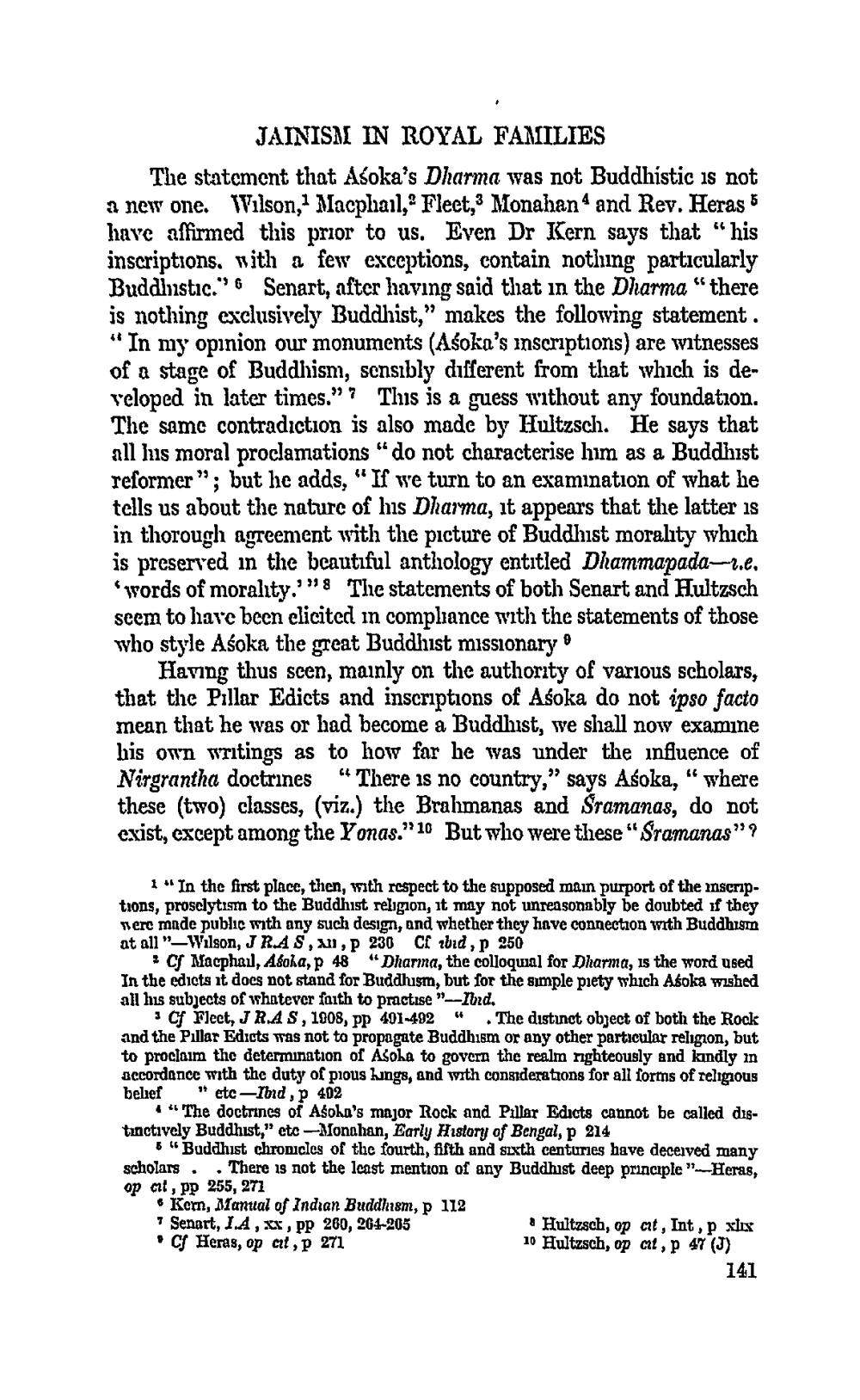________________ of a stage of Buddi monuments (Asokn's the following stater JAINISM IN ROYAL FAMILIES The statement that Asoka's Dharma was not Buddhistic is not a new one. Wilson,1 Macpharl, Fleet 3 Monahan and Rev. Heras 5 have affirmed this prior to us. Even Dr Kern says that "his inscriptions, with a few exceptions, contain noting particularly Buddhistic." 6 Senart, after having said that in the Dharma "there is nothing exclusively Buddhist," makes the following statement. "In my opinion our monuments (Asoka's inscriptions) are witnesses of a stage of Buddhism, sensibly different from that which is de veloped in later times."? This is a guess without any foundation. The same contradiction is also made by Hultzsch. He says that all lus moral proclamations "do not characterise him as a Buddhist reformer"; but he adds, "If we turn to an examination of what he tells us about the nature of his Dharma, it appears that the latter is in thorough agreement with the picture of Buddhist morality which is preserved in the beautiful anthology entitled Dhammapada-.e. words of morality.'"8 The statements of both Senart and Hultzsch seem to have been clicited in compliance with the statements of those who style Asoka the great Buddhist missionary Having thus scen, mainly on the authority of various scholars, that the Pillar Edicts and inscriptions of Asoka do not ipso facto mean that he was or had become a Buddhist, we shall now examine bis own writings as to how far he was under the influence of Nirgrantha doctrines "There is no country," says Asoka," where these two) classes, (viz.) the Brahmanas and Sramanas, do not exist, except among the Yonas." 10 But who were these "Sramanas"? 1 "In the first place, then, with respect to the supposed main purport of the inscriptions, prosclytism to the Buddhist religion, it may not unreasonably be doubted if they were made public with any such design, and whether they have connection with Buddhista at all "_Wilson, JRAS,1,P 230 CC bid, p 250 CS Macphall, Asoka,p 48 "Dharma, the colloquia] for Dharma, is the word used In the edicts it does not stand for Buddhism, but for the simple piety which Aboka wished all his subjects of whatever faith to practise "--Iurd, : Cf Flect, JR.AS, 1908, pp 401-402 " The distinct object of both the Rock and the Pillar Edicts was not to propagate Buddhism or any other particular religion, but to proclaim the determination of Aloha to gover the realin righteously and kindly in accordance with the duty of prous kings, and with considerations for all forms of religious belief " etc-Ind, 402 4 "The doctrines of Acoha's major Rock and Pillar Edicts cannot be called distinctively Buddhist," etc -Monahan, Early History of Bengal, p 214 "Buddhist chronicles of the fourth, fifth and sixth centuries have deceived many scholars. There is not the least mention of any Buddhist deep principle "-Heras, opcil, PP 255, 271 Kern, Manual of Indian Buddhism,p 112 * Senart, I.A,xx, pp 260, 264-205 Hultzsch, op art, Int ,p xlix Cf Heras, op cit, P 271 10 Hultzsch, op cit, p 47 (J) 141




